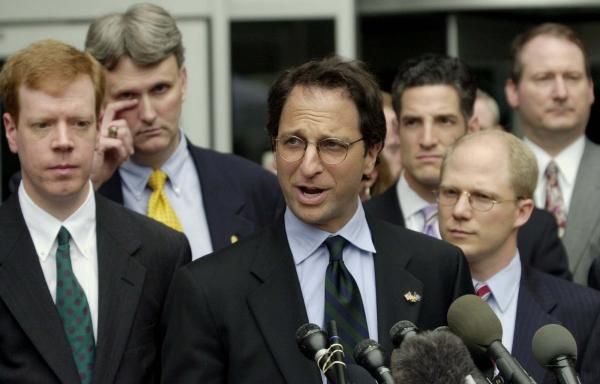 Loren Steffy, the Houston Chronicle’s business columnist, has been having a hard time lately.
Loren Steffy, the Houston Chronicle’s business columnist, has been having a hard time lately.
You will recall that Steffy was one of the leaders of the mainstream media lynch mob that embraced the myth of the Greed Narrative in calling for harsh criminal prosecutions of former Enron executives, particularly the late Ken Lay and Jeff Skilling.
However, now that pretty much the same thing that happened to Enron has happened to Bear Stearns, Freddie and Fannie, Merrill Lynch, Lehman Brothers, AIG and any number of other trust-based businesses during the current financial crisis, Steffy has had difficulty making sense of it all. We can’t just throw all of those executives in prison, can we?
Now to make things even more confusing for Steffy, Bernard Madoff’s alleged Ponzi scheme has unraveled. Steffy’s column from yesterday bemoans that Madoff, as with Enron, was at least in large part the result of lax regulation:
And so the era of lax regulation that began with Enron ends with the Madoff madness looming as a monument to the SEC’s ineptitude. Already under fire for smelling the flowers while Bear Stearns — to cite one example — charged toward collapse, the SEC’s days may be numbered. Treasury Secretary Henry Paulson introduced a sweeping reform plan earlier this year that would relieve it of much of its oversight role.
But wait a minute. The SEC had been continually warned about Madoff’s company (see Henry Markopolos’ 2005 notice to the SEC here). Moreover, the "lax regulation" that Steffy complains about came at a time of unparalleled growth in the SEC during the supposedly pro-business Bush Administration:
Since 2000 and especially after the fall of Enron, the SEC’s annual budget has ballooned to more than $900 million from $377 million. . . . Its full-time examination and enforcement staff has increased by more than a third, or nearly 500 people. The percentage of full-time staff devoted to enforcement — 33.5% — appears to be a modern record, and it is certainly the SEC’s highest tooth-to-tail ratio since the 1980s. The press corps and Congress both were making stars of enforcers like Eliot Spitzer, so the SEC’s watchdogs had every incentive to ferret out fraud.
Yet, the regulators couldn’t put the pieces of the puzzle together (even Spitzer’s family was a victim of Madoff!). So, Steffy’s solution is the SEC "needs to be put out to pasture." In other words, rearrange the deck chairs on the Titanic.
Look, as J. Robert Brown and Larry Ribstein point out, there are understandable systemic reasons why Madoff was able to slip through the regulatory cracks for decades. Most of those flaws are not going to be fixed by simply creating a Super-SEC. Indeed, the suggestion that such regulatory remedies are the best protection against the next Madoff (and, rest assured, there will be many) actually is counter-productive to understanding the truly best protection from such schemes.
The primary justification for this regulatory retrofitting is the plight of the innocent investors (and it sure is an interesting bunch) who lost millions when Madoff’s company went bust. Although nothing is wrong with compassion for folks who lose money in an investment fraud, it’s important to remember that those investors who lost their nest egg in the Madoff implosion were imprudent in their investment strategy. They should have diversified their Madoff holdings or done some real due diligence into his operation if they were going to bet the farm on it. Even though every one of Madoff investors carry insurance on their homes and cars, one can only speculate why they didn’t attempt to understand the risk of their investment in Madoff’s company better than most did. Most likely, many of the investors simply did not care to truly understand how Madoff claimed to create wealth for them in the first place. Chidem Kurdas’ speaks to this dynamic in his timely study on the demise of the Manhattan Capital hedge fund:
As the failure of the hedge-fund firm Manhattan Capital demonstrates, both government regulators and market players can make mistakes resulting from cognitive biases. Responding to such mistakes by strengthening government watchdogs, although often recommended, reduces both the watchdogs’ and the public’s incentive to learn, thereby creating a vicious spiral of regulation, regulatory failure, and even more regulation.
Thus, as Larry Ribstein has been advocating for years, no amount of increased regulation is likely ever to do a better job than the market in mitigating fraud loss. It’s easy to throw Madoff in prison for the rest of his life, simply attribute the investment loss to him and pledge to do a better job of policing the crooks next time. It’s a lot harder to understand how Madoff’s investors could have hedged their risk of Madoff’s fraud. As this WSJ editorial concludes, "expecting the SEC to prevent a determined and crafty con man from separating investors from their money is no more sensible than putting your life savings with a Bernard Madoff."









